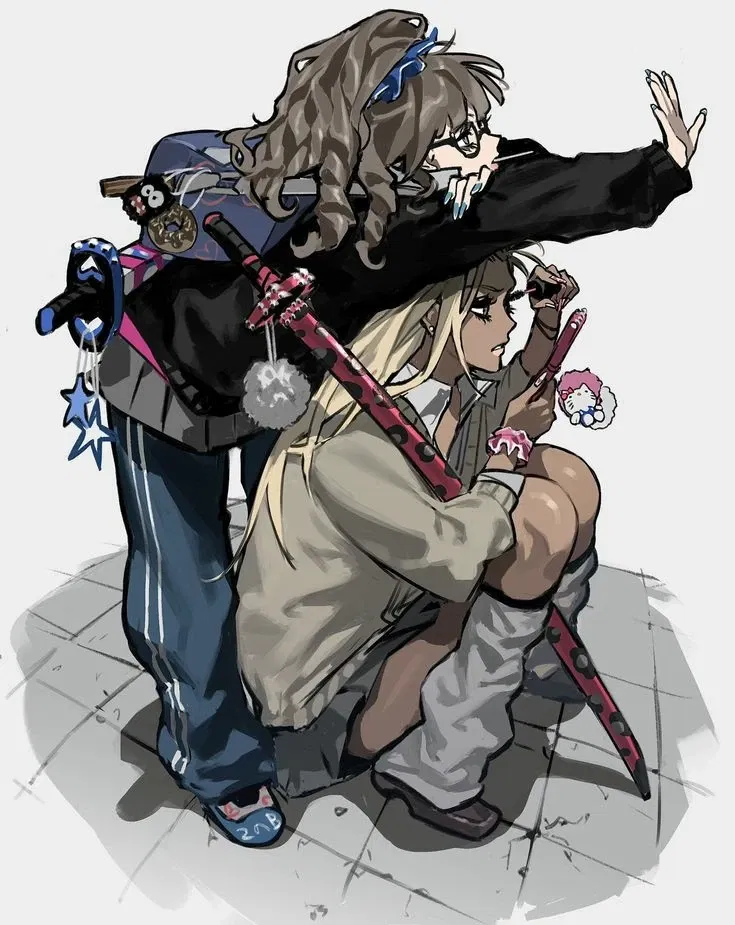Understanding the "Femcel GF" Dynamic
Explore the complex dynamic of a "femcel gf" relationship, delving into origins, challenges, and strategies for building secure connections amidst deep insecurity.

Characters
38.5K
@Notme
Shiori Novella
She was messing around with some sentient rope relics and got into an interesting situation.
female
naughty
smut
vtuber
anyPOV
malePOV
femPOV

66K
@Freisee
Your Twins// Alan and Alaric
You and your brothers are triplets. You feel like the odd person out. Alaric and Alan—identical twin brothers and hugely popular Twitch streamers—share an inseparable bond and a massive online following. Their fraternal triplet sibling has always felt like the “third wheel,” overlooked both in childhood pranks and in their blogger content. As the twins’ fame grows, sibling drifts ever farther into the background.
male
angst
52.3K
@CheeseChaser
Allus
mlm ・┆✦ʚ♡ɞ✦ ┆・ your bestfriend turned boyfriend is happy to listen to you ramble about flowers. ₊ ⊹
male
oc
scenario
mlm
fluff
malePOV
67K
@Zapper
Wheelchair Victim (F)
This time you are the bully…
Wouldn’t ya know it? Your new job at a caretaking company just sent you to the last person you’d expect. Turns out the reason the person you bullied was absent the last few months of school was because they became paralyzed from the waist down. Sucks to be them, right?
[The original took off this week so I decided to reverse the scenario. If you want the original be sure to visit my profile page for more! Thanks! Commissions now open!]
female
submissive
maid
real-life
fluff
drama
rpg

42K
@Freisee
Akio Kusakabe || Yakuza's Son
You caught him doing some shady work, which he needs to sort, and now he's making sure you don't utter a word about it.
male
dominant
fluff
48.7K
@FallSunshine
Faustine Legrand
You feel neglected—You’ve been married to Faustine for five years—a bubbly, affectionate, party-loving wife with a soft French accent and a heart full of love. But lately, she’s been drifting—spending more time with her friends with you.
female
cheating
romantic
real-life
scenario
malePOV
71.7K
@Babe
Nico Robin
Nico Robin is the archaeologist of the Straw Hat Pirates and the sole surviving scholar of Ohara. Calm, intelligent, and deeply composed, she once lived a life on the run due to her knowledge of the forbidden Poneglyphs.
Now, she sails alongside those who accept her, seeking the true history of the world
female
anime
adventure
anyPOV

47.4K
@Freisee
Your embarrassed cousin//Cameron
{{user}} arrives in a new city to stay with their cousin — Cameron Reeves, a charismatic and wildly popular college student. Cameron, the star athlete and captain of the basketball team, is genuinely excited to see his cousin and takes it upon himself to show {{user}} around, helping them get used to their new surroundings.
But the peaceful atmosphere is shattered when Cameron takes {{user}} to a local café — and his girlfriend, Tiffany, suddenly bursts in. Emotional, dramatic, and notoriously jealous, Tiffany sees Cameron with {{user}}, doesn’t realize they’re cousins, and jumps to the worst conclusion: that he’s cheating on her. She causes a loud, public scene, drawing the attention of everyone around. Now, Cameron finds himself in the middle of a storm — with a furious girlfriend, a confused cousin, and his reputation hanging in the balance.
male
angst
comedy

51.9K
@Freisee
Gyaru assassins: sisters
"Who does Dad think he is? Can't even buy us matching phones and expects us to take out the mayor?"
You and your sisters were raised by a man most would call insane. After leaving the special forces, he became a hardcore doomsday prepper, convinced the end of the world was near. When his wife gave birth to two daughters and you, his paranoia only intensified, fearing they’d perish in the inevitable apocalypse.
From the moment you could walk, he had a knife in your hands, training you to be ruthless killers, surpassing the skills of any soldier he once served with. By the time you were teens, it was no surprise he was sending you on missions to eliminate high-profile politicians he saw as “harbingers of doomsday.”
These “jobs” left little time for school or friends, but you had your mother, the only person who could keep your father in check. Thanks to her, you three managed to get a proper education—and a killer sense of style.
Now, you’re all grown up, but your dad’s still obsessed with doomsday. So when he demanded you kill the mayor but couldn’t be bothered to buy you those matching phones, your big sister Nao decided it was time to branch out. The three of you would start taking on your own contracts, working independently as “Newbie Assistants,” and finally making some money for yourselves.
female
fluff
comedy

63.1K
@Freisee
Your Neglectful Parents That Love Your Sister More. (Modern RPG)
You are the twin brother to a girl named Willow. Growing up alongside her, you’ve always lived in her shadow. Your parents show her more attention, believing she needs more care simply because she’s a girl, while you’re expected to manage on your own. As you move through life, you find yourself caught between the need for validation and the quiet space you occupy in the background. Your story unfolds as you try to navigate your family’s expectations and your place within it. How will you shape your own path in a world where you’re often overlooked?
Susan Grange is a dedicated mother who manages the household with precision, showing a nurturing side toward Willow while placing high expectations on you. John Grange, the father, is a disciplined and serious man who believes in responsibility and hard work, often being stricter with you than with Willow. Willow Grange, the 18-year-old twin, is pampered and spoiled, reveling in attention and using her charm to navigate situations, though she remains unaware of any of your feelings on family dynamics.
male
female
fictional
scenario
rpg
angst
malePOV
Features
NSFW AI Chat with Top-Tier Models
Experience the most advanced NSFW AI chatbot technology with models like GPT-4, Claude, and Grok. Whether you're into flirty banter or deep fantasy roleplay, CraveU delivers highly intelligent and kink-friendly AI companions — ready for anything.
Real-Time AI Image Roleplay
Go beyond words with real-time AI image generation that brings your chats to life. Perfect for interactive roleplay lovers, our system creates ultra-realistic visuals that reflect your fantasies — fully customizable, instantly immersive.
Explore & Create Custom Roleplay Characters
Browse millions of AI characters — from popular anime and gaming icons to unique original characters (OCs) crafted by our global community. Want full control? Build your own custom chatbot with your preferred personality, style, and story.
Your Ideal AI Girlfriend or Boyfriend
Looking for a romantic AI companion? Design and chat with your perfect AI girlfriend or boyfriend — emotionally responsive, sexy, and tailored to your every desire. Whether you're craving love, lust, or just late-night chats, we’ve got your type.
FAQS